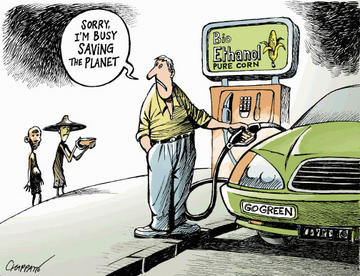Turning Food into Fuel is Not the Solution

The Association of American Physicians and Surgeons (AAPS) has released a warning that U.S. and European policy to increase the production of biofuels could lead to almost 200,000 deaths in poorer countries. How? Mostly through higher food prices. Most biofuels are made using food crops like corn at this time, and diverting corn to ethanol refineries not only increases the price of corn, but it also encourage farmers to plant more of it, leaving less space for other types of crops, driving up their price too. This is a big deal if you live on $1-2 a day...
The AAPS writes: "Research by the World Bank indicates that the increase in biofuels production over 2004 levels would push more than 35 million additional people into absolute poverty in 2010 in developing countries. Using statistics from the World Health Organization (WHO), Dr. Indur Goklany estimates that this would lead to at least 192,000 excess deaths per year, plus disease resulting in the loss of 6.7 million disability-adjusted life-years (DALYs) per year. These exceed the estimated annual toll of 141,000 deaths and 5.4 million lost DALYs that the World Health Organization attributes to global warming. Thus, developed world policies intended to mitigate global warming probably have increased death and disease in developing countries rather than reducing them. Goklany also notes that death and disease from poverty are a fact, whereas death and disease from global warming are hypothetical."
Corn Ethanol Subsidies Have to Go

We've been saying it for a long time: Biofuels can be a good tool, but they need to be made from non-food crops and take into account environmental factors like land-use issues and energy input-output ratios (corn ethanol isn't doing too well in that area).
Sadly, the farm-lobby in the US and Europe is very powerful and subsidies will be hard to terminate. But it must be done, and the quicker, the better! Our resources shouldn't support something that has modest environmental benefits and negative side-effects on the world's food supply. AutoBlogGreen
Read more from a hugger